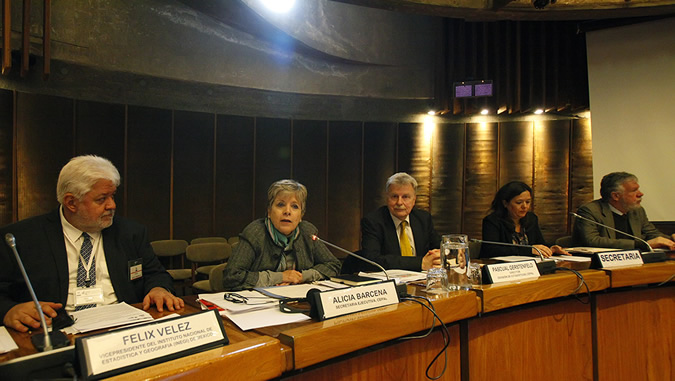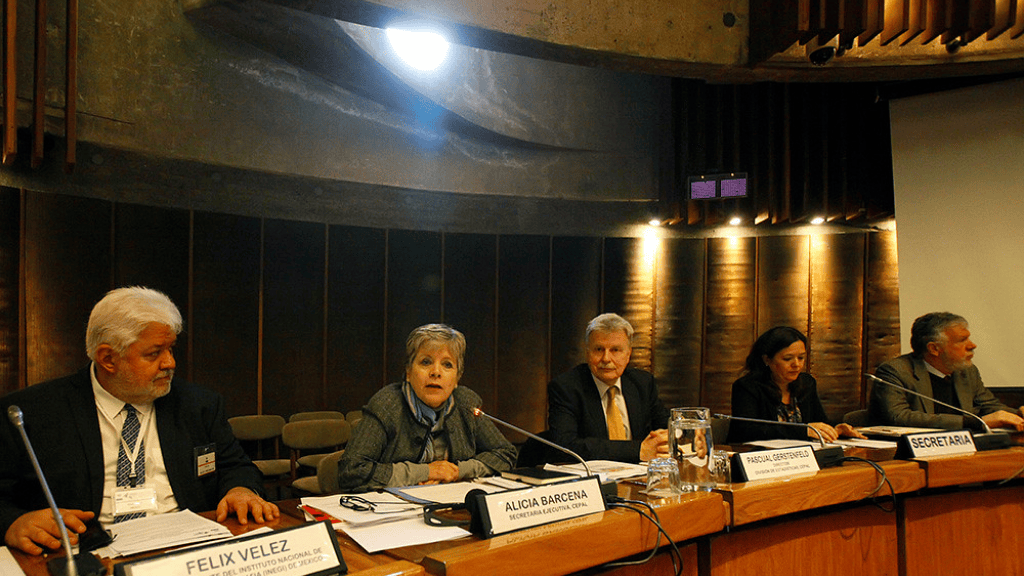Countries from the Region Address at ECLAC Centrality of the Statistical Framework for Follow-Up to the 2030 Agenda
Work area(s)
The regional organization’s Executive Secretary, Alicia Bárcena, presented the Forum of the Countries of Latin America and the Caribbean on Sustainable Development, at the XV Meeting of the Executive Committee of the Statistical Conference of the Americas (SCA).

Representatives of national statistics institutes from countries in the region will meet from today through June 16 at the headquarters of the Economic Commission for Latin America and the Caribbean (ECLAC) to review measurement and statistical coordination mechanisms for follow-up of the 2030 Agenda, to approve the work planned for the 2016-2017 period in the framework of the Statistical Conference of the Americas (SCA), and to analyze sources and uses of non-traditional data.
The XV Meeting of the Executive Committee of the SCA, a subsidiary body of ECLAC, was inaugurated today in Santiago, Chile by the Executive Secretary of this regional commission, Alicia Bárcena; the Vice President of Mexico’s National Institute of Statistics and Geography (INEGI), Félix Vélez, as President of the Executive Committee; and the Director of ECLAC’s Statistics Division, Pascual Gerstenfeld.
“The Statistical Conference of the Americas has become a privileged platform for creating an interinstitutional and intersectoral regional architecture that facilitates the spaces needed to implement national follow-up mechanisms for the 2030 Agenda. As always, they have all of ECLAC’s technical and institutional support to address the challenges that this Agenda implies,” Alicia Bárcena said.
Meanwhile, Félix Vélez, from the INEGI in Mexico, stressed that the Conference’s work should contribute elements for decision-making at all levels of government. In addition to Mexico, which holds the Presidency, the SCA’s Executive Committee for 2016-2017 is made up of Belize, Costa Rica, Ecuador, Peru, Spain and Uruguay, whose representatives are attending this meeting along with delegates from other SCA member countries.
This is the first executive committee meeting of one of ECLAC’s nine subsidiary bodies since the regional organization held its thirty-sixth session in Mexico (on May 23-27), where participants approved the creation of the Forum of the Countries of Latin America and the Caribbean on Sustainable Development as a regional mechanism for follow-up of the 2030 Agenda, in which those bodies, and others, will participate. The forum was created by countries under the leadership of Peru, and it will be presided by Mexico until 2018.
After the inauguration, a seminar was held on the statistical framework for follow-up to the 17 Sustainable Development Goals (SDGs), where Alicia Bárcena presented the main outcomes of the thirty-sixth session: the new strategic document in which ECLAC offers an analytical framework for the 2030 Agenda; and the debate on implementation of this Agenda and on strengthening the regional architecture, through ECLAC’s subsidiary bodies and the new forum approved in Mexico.
According to the Executive Secretary, ECLAC proposes in the document Horizons 2030: Equality at the Centre of Sustainable Development progressive structural change and a big environmental push for regional development with equality at its core. For the implementation of the 2030 Agenda, the organization establishes several recommendations, including the strengthening of both the statistical capacities for measuring SDGs as well as the regional architecture—areas in which the SCA plays a key role.
With regard to the global arena, Alicia Bárcena valued the role of the Latin American and Caribbean countries that belong to the Inter-agency and Expert Group on SDG Indicators, and also the High-level Group for Partnership, Coordination and Capacity-Building for Post-2015 Monitoring. Representing the region, Brazil, Colombia, Cuba, Jamaica and Mexico participate in this first group, while Argentina, the Bahamas, Ecuador, El Salvador and Saint Lucia take part in the second one.
The core focuses of the Statistical Conference of the America’s Strategic Plan for 2015-2025, approved in its eighth meeting held in Ecuador in November 2015, are to promote the development of national statistics and their international comparability; contribute to the institutional strengthening of national statistics systems; foster international cooperation in this area; and promote open data initiatives and the incorporation of non-traditional data, such as geographic information and geo-referencing tools.
This last category also includes the use of administrative records for statistical purposes. Anders Wallgren and Britt Wallgren, experts from Statistics Sweden (that country’s statistics institute) and from the state university of Örebro, will give a keynote lecture on this topic in the framework of this meeting.
Based on the Strategic Plan, at this meeting delegates will analyze and weigh approval of the 2016-17 program of activities of the Conference’s seventeen Working Groups, which address specific matters such as censuses, household surveys, national accounts or statistics on poverty, gender or childhood, among others.
As side events to this meeting, ECLAC will also host this week a seminar on census processes in Latin America as of 2016, a gathering on measuring well-being, and a meeting of the SCA and the United Nations Committee of Experts on Global Geospatial Information Management for the Americas (UN-GGIM for the Americas).
Related content
Inauguración del XV Comité Ejecutivo de la Conferencia Estadística de las Américas
Discurso de la Secretaria Ejecutiva de la CEPAL, Alicia Bárcena.
La dimensión regional del seguimiento de la Agenda 2030 para el Desarrollo Sostenible
Presentación de Alicia Bárcena, Secretaria Ejecutiva de la CEPAL, en el seminario sobre el marco estadístico para el seguimiento de los 17 Objetivos de Desarrollo Sostenible (ODS), celebrado en la…


Seminar on the follow-up framework of the Sustainable Development Goals (SDGs)
This seminar is held within the framework of the Fifteenth Meeting of the Executive Committee.

Seminario: Avances y Retos de los Procesos Censales en América Latina al 2016
El Taller de trabajo convocado por parte de Venezuela, en su calidad de Coordinador del Grupo de Trabajo de Censos de la CEA CEPAL, en conjunto con CELADE (Secretaría Técnica del Grupo) y UNFPA, se…

Iniciativa de la OCDE y la CEPAL sobre la medición del bienestar
OCDE y CEPAL están llevando a cabo una iniciativa conjunta para establecer una red de intercambio de conocimientos para producir estadísticas mejores y más comparables sobre el bienestar y el…

Reunión Conjunta de los Comités Ejecutivos del Comité de Expertos de las Naciones Unidas sobre Gestión de Información Geoespacial para las Américas (UN-GGIM para las Américas) y de la Conferencia Estadística de las Américas de la CEPAL
El objetivo de esta reunión es coordinar esfuerzos y definir una agenda conjunta para la integración de información estadística y geoespacial.
